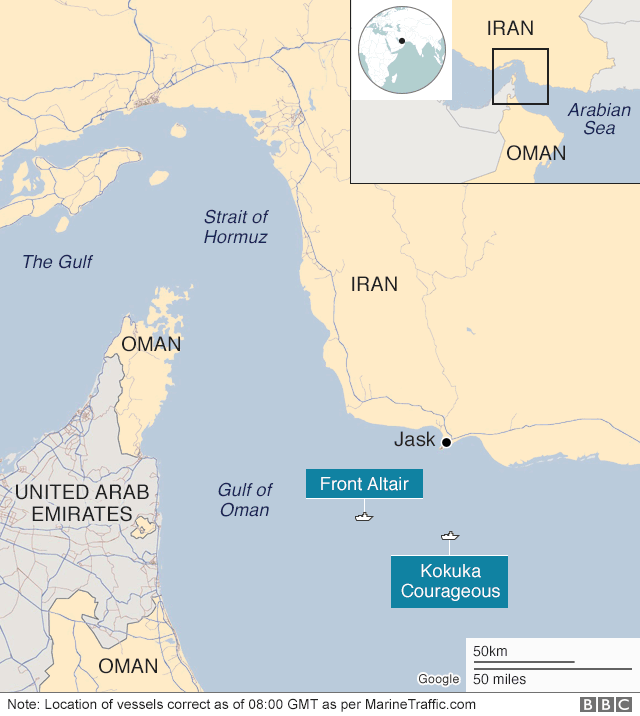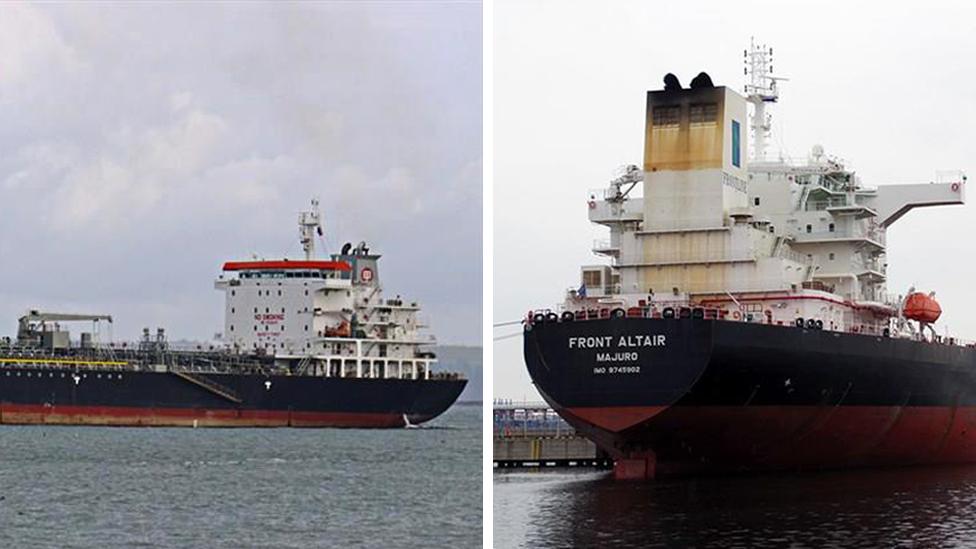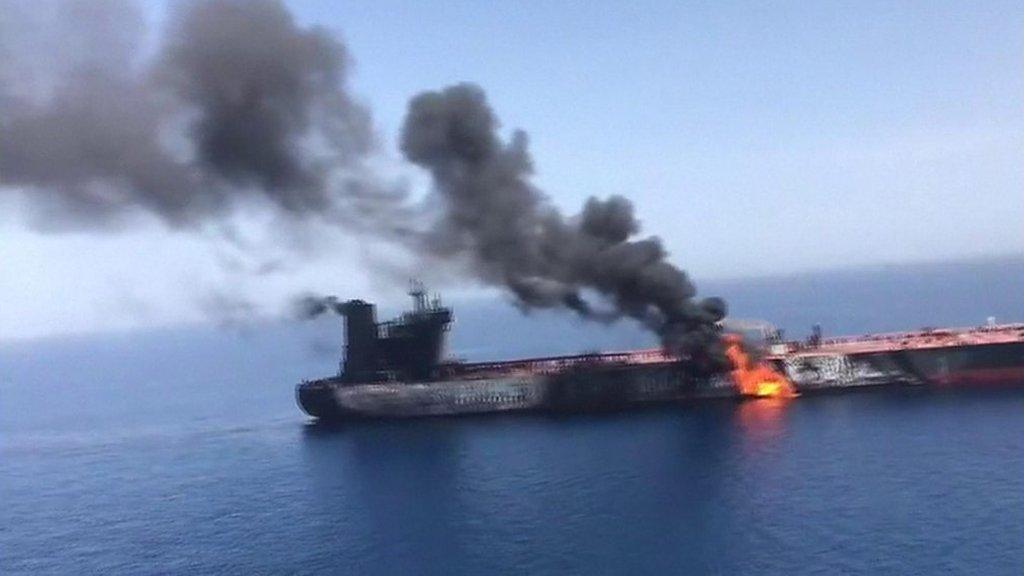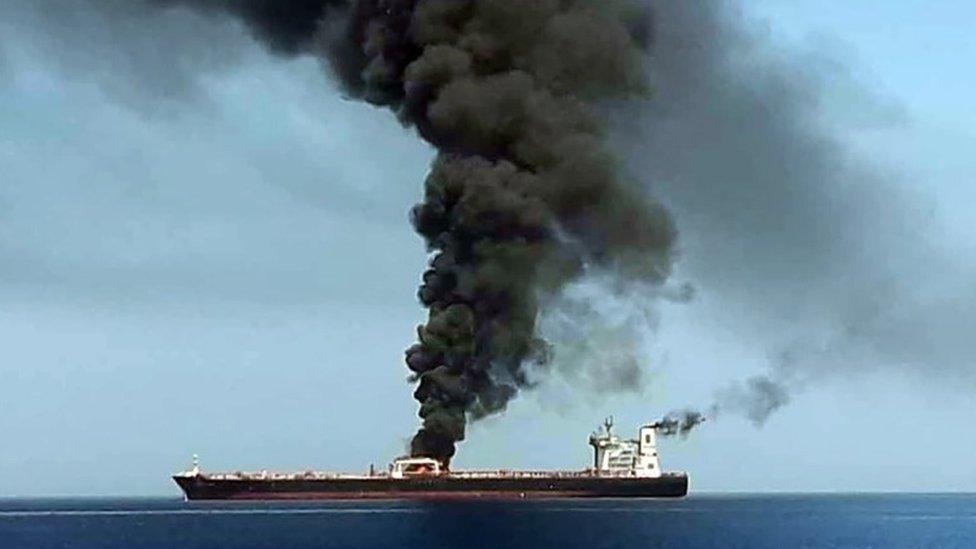Gulf of Oman tanker 'attacks': Crews rescued amid rising tensions
- Published
Iranian TV footage shows a burning tanker
Two oil tankers have been significantly damaged in suspected attacks in the Gulf of Oman.
The Japanese-owned Kokuka Courageous with 23 crew members aboard and Norway's Front Altair with 23 people were abandoned after the blasts. Iran and the US say they evacuated the crew.
It is unclear what caused the blasts coming amid high US-Iran tensions.
A senior Iranian official told the BBC: "Iran has no connection with the incident."
The suspected attack in one of the world's busiest oil routes comes a month after four oil tankers were attacked off the United Arab Emirates.
No group or country has admitted May's incident, which also caused no casualties.
The US at the time blamed Iran - but Tehran denied the accusations.
Oil prices jumped as much as 4% after Thursday's incident.
The Gulf of Oman lies at one end of the strategic Strait of Hormuz - a vital shipping lane through which hundreds of millions of dollars of oil pass.
What do we know about the explosions?
The cause has not been confirmed.
The Front Altair had been "attacked", the Norwegian Maritime Authority said, leading to three explosions on board.
Wu I-fang, a spokesman for Taiwan's CPC Corp oil refiner, which chartered the Front Altair, said it was carrying 75,000 tonnes of naphtha and was "suspected of being hit by a torpedo", although this has not been confirmed.
Other unverified reports suggested a mine attack.


The ship's owner, Frontline, said the vessel was on fire - but denied reports in Iran media it had sunk.
The operator of the Kokuka Courageous, BSM Ship Management, said its crew abandoned ship and were rescued by a passing vessel.
The tanker was carrying methanol and was not in danger of sinking, a spokesman said.
It is currently located about 130km (80 miles) from Fujairah in the UAE and 16 miles from Iran. The cargo remains intact.


The key thing now is to determine exactly what caused the damage to the two tankers in the Gulf of Oman, and that will provide powerful clues as to who may have carried out the attacks.
The US has a powerful naval presence in the region and will have a range of intelligence assets to draw upon.
A US official has already noted that they believe that they will be able to recover enough debris from the attacks "to come up with solid evidence for tracing them back to their source".
What happens then is a question of strategic judgement.
Countries like France and Germany are already urging caution and pressing for a de-escalation.
But an attack on two merchant vessels in international waters is a hugely significant act.
And these latest attacks - unlike the sabotage with limpet mines a month ago - risked causing significant loss of life.

Who came to the rescue?
Iranian state media said Iran had rescued the crew members of both vessels and they had been taken to the port of Jask.

The 21 crew on the Kokuka Courageous (L) and 23 on the Front Altair have been rescued
The US 5th Fleet, based in Bahrain, said it had sent the USS Bainbridge to assist.
Spokesman Josh Frey said in a statement: "US naval forces in the region received two separate distress calls at 06:12 local time (03:12 GMT) and a second one at 07:00."
The US Navy later said 29 crew members from the Kokuka Courageous were taken on board the USS Bainbridge.
Why are US-Iran tensions so high?
In 2018, the US pulled out of the landmark nuclear deal reached in 2015 that was aimed at curbing Iran's nuclear activities.
The move was strongly criticised by a number of countries, including America's closest allies.
In May, President Donald Trump tightened US sanctions on Iran - mainly targeting its oil sector.
Iran then announced it was suspending some commitments under the nuclear deal.
In recent months the US has strengthened its forces in the Gulf - saying there was a danger of Iranian attacks.
Why does the Strait of Hormuz matter?
It has sent an aircraft carrier strike group and B-52 bombers to the region.
In response, Iran has accused the US of aggressive behaviour.
Those tensions rose markedly after the 12 May limpet mine attacks in the UAE.
The BBC was invited on board the USS Abraham Lincoln in the Arabian Sea
The UAE blamed an unnamed "state actor".
The US said that actor was Iran, an accusation Tehran has denied.
How has the world reacted?
UN Secretary General António Guterres condemned Thursday's blasts.
He told the Security Council that the world cannot afford "a major confrontation in the Gulf region".
Meanwhile, the EU called for "maximum restraint", while Russia said no-one should jump to conclusions or use the incident to put pressure on Iran, a Russian ally.
The incident is expected to be discussed at a closed-door meeting of the UN Security Council later on Thursday.
Paolo d'Amico, chairman of the tanker association, Intertanko, said the two vessels had been attacked, and expressed concern about dangers to other crews.
"If the waters are becoming unsafe, the [oil] supply to the entire Western world could be at risk," he said.
- Published13 June 2019

- Published18 June 2019
